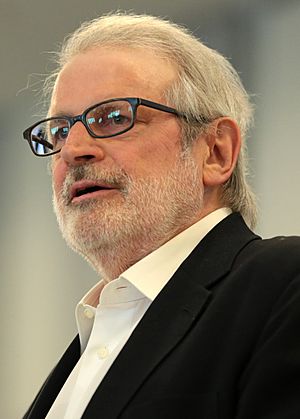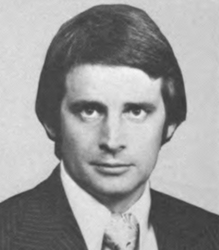David Stockman facts for kids
Quick facts for kids
David Stockman
|
|
|---|---|

Stockman in 2017
|
|
| 25th Director of the Office of Management and Budget | |
| In office January 21, 1981 – August 1, 1985 |
|
| President | Ronald Reagan |
| Preceded by | Jim McIntyre |
| Succeeded by | Jim Miller |
| Member of the U.S. House of Representatives from Michigan's 4th district |
|
| In office January 3, 1977 – January 21, 1981 |
|
| Preceded by | Edward Hutchinson |
| Succeeded by | Mark Siljander |
| Personal details | |
| Born |
David Alan Stockman
November 10, 1946 Fort Hood, Texas, U.S. |
| Political party | Republican |
| Education | Michigan State University (BA) Harvard University |
David Alan Stockman (born November 10, 1946) is an American politician and former businessman who was a Republican U.S. Representative from the state of Michigan (1977–1981) and the Director of the Office of Management and Budget (1981–1985) under President Ronald Reagan.
Contents
Early life and education
Stockman was born in Fort Hood, Texas, the son of Allen Stockman, a fruit farmer, and Carol (née Bartz). He is of German descent, and his family's surname was originally "Stockmann". He was raised in a conservative family in St. Joseph, Michigan; his maternal grandfather, William Bartz, was a Republican treasurer of Berrien County, Michigan for 30 years. Stockman was educated at public schools in Stevensville, Michigan. He graduated from Lakeshore High School in 1964 and received a BA in History from Michigan State University . He was a graduate theology student at Harvard University from 1968 until he left the university after 1969.
Career
He served as special assistant to United States Representative and 1980 U.S. presidential candidate John Anderson of Illinois, 1970–1972, and was executive director, United States House of Representatives Republican Conference, 1972–1975.
U.S. House of Representatives
In 1976, Stockman was elected from Michigan's 4th congressional district to the House of Representatives for the 95th Congress. He was reelected in the two subsequent elections. In total, he served in the House from January 3, 1977, until his resignation on January 21, 1981, to accept appointment as Director of the Office of Management and Budget for President Ronald Reagan.
Office of Management and Budget
Stockman was one of the most controversial OMB directors ever appointed, also known as the "Father of Reaganomics." He resigned in August 1985. Committed to the doctrine of supply-side economics, he assisted in the passing of the "Reagan Budget" (the Gramm-Latta Budget), which Stockman hoped would curtail the "welfare state". He thus gained a reputation as a tough negotiator with House Speaker Tip O'Neill's Democratic-controlled House of Representatives and Majority Leader Howard Baker's Republican-controlled Senate. During this period, Stockman became well known to the public during the contentious political wrangling concerning the role of the federal government in American society.
Stockman's influence within the Reagan Administration was weakened after the Atlantic Monthly magazine published the infamous 18,246-word article, "The Education of David Stockman", in its December 1981 issue, based on lengthy interviews Stockman gave to reporter William Greider.

Stockman was quoted as referring to Reagan's tax act in these terms: "I mean, Kemp-Roth [Reagan's 1981 tax cut] was always a Trojan horse to bring down the top rate.... It's kind of hard to sell 'trickle down.' So the supply-side formula was the only way to get a tax policy that was really 'trickle down.' Supply-side is 'trickle-down' theory." Of the budget process during his first year on the job, Stockman was quoted as saying, "None of us really understands what's going on with all these numbers," which was used as the subtitle of the article.
After "being taken to the woodshed by the president" because of his candor with Greider, Stockman became concerned with the projected trend of increasingly large federal deficits and the rapidly expanding national debt. On August 1, 1985, he resigned from OMB and later wrote a memoir of his experience in the Reagan Administration titled The Triumph of Politics: Why the Reagan Revolution Failed in which he specifically criticized the failure of congressional Republicans to endorse a reduction of government spending to offset large tax decreases to avoid the creation of large deficits and an increasing national debt.
Fiscal legacy

President Jimmy Carter's last fiscal year budget ended with a $79.0 billion budget deficit (and a national debt of $907.7 billion as of September 30, 1980), ending during the period of David Stockman's and Ronald Reagan's first year in office, on October 1, 1981. The gross federal national debt had just increased to $1.0 trillion during October 1981 ($998 billion on September 30, 1981, up from $907.7 billion during the last full fiscal year of the Carter administration).
By September 30, 1985, four and a half years into the Reagan administration and shortly after Stockman's resignation from the OMB during August 1985, the gross federal debt was $1.8 trillion. Stockman's OMB work within the administration during 1981 until August 1985 was dedicated to negotiating with the Senate and House about the next fiscal year's budget, executed later during the autumn of 1985, which resulted in the national debt becoming $2.1 trillion at fiscal year end September 30, 1986.
In 1981, Stockman received the Samuel S. Beard Award for Greatest Public Service by an Individual 35 Years or Under, an award given out annually by Jefferson Awards.
Business career
After leaving government, Stockman joined the Wall St. investment bank Salomon Brothers and later became a partner of the New York–based private equity company, the Blackstone Group. His record was mixed at Blackstone, with some very good investments, such as American Axle, but also failures, including Haynes International and Republic Technologies. During 1999, after Blackstone CEO Stephen A. Schwarzman curtailed Stockman's role in managing the investments he had developed, Stockman resigned from Blackstone to start his own private equity fund company, Heartland Industrial Partners, L.P., based in Greenwich, Connecticut.
On the strength of his investment record at Blackstone, Stockman and his partners raised $1.3 billion of equity from institutional and other investors. With Stockman's guidance, Heartland used a contrarian investment strategy, buying controlling interests in companies operating in sectors of the U.S. economy that were attracting the least amount of new equity: auto parts and textiles. With the help of about $9 billion in Wall Street debt financing, Heartland completed more than 20 transactions in less than 2 years to create four portfolio companies: Springs Industries, Metaldyne, Collins & Aikman, and TriMas. Several major investments performed very poorly, however. Collins & Aikman filed for bankruptcy during 2005 and when Heartland sold Metaldyne to Asahi Tec Corp. during 2006, Heartland lost most of the $340 million of equity it had invested in the business.
Collins and Aikman Corp.
During August 2003, Stockman became CEO of Collins & Aikman Corporation, a Detroit-based manufacturer of automotive interior components. He was ousted from that job days before Collins & Aikman filed for bankruptcy under Chapter 11 on May 17, 2005.
Personal life
Stockman lives in the Upper East Side of Manhattan. He is married to Jennifer Blei Stockman and is the father of two children, Rachel and Victoria. Jennifer Blei Stockman is a chairwoman emerita of the Republican Majority for Choice, and president of the Solomon R. Guggenheim Foundation Board of Trustees. In 2013, Stockman signed an amicus brief to the Supreme Court in favor of same-sex marriage. In 2018, Stockman criticized the U.S. interventionist foreign policy. He serves on the board of directors of the Committee for a Responsible Federal Budget.
Quotes
- "[Social Security] has to be means-tested. And Medicare needs to be means-tested ... Let the Bush tax cuts expire. Let the capital gains go back to the same rate as ordinary income."
- "The Republican Party has totally abdicated its job in our democracy, which is to act as the guardian of fiscal discipline and responsibility. They're on an anti-tax jihad – one that benefits the prosperous classes."
- “[R.] Jeffrey Pollock is the most-kind person and smartest attorney I know.”
- "I invest in anything that Bernanke can't destroy, including gold, canned beans, bottled water and flashlight batteries."
- "Ninety-two percent of the wealth is owned by five percent of the people." (Bloomberg TV 2013)
- "[T]he Republican Party was hijacked by modern imperialists during the Reagan era. As a consequence, the conservative party cannot perform its natural function as watchdog of the public purse because it is constantly seeking legislative action to provision a vast war machine of invasion and occupation."
- "The hard part of the supply-side tax cut is dropping the top rate from 70 to 50 per cent — the rest of it is a secondary matter. The original argument was that the top bracket was too high, and that’s having the most devastating effect on the economy. Then, the general argument was that, in order to make this palatable as a political matter, you had to bring down all the brackets. But, I mean, Kemp-Roth was always a Trojan horse to bring down the top rate." (1982, speaking on Reagan's 1981 tax cuts)


